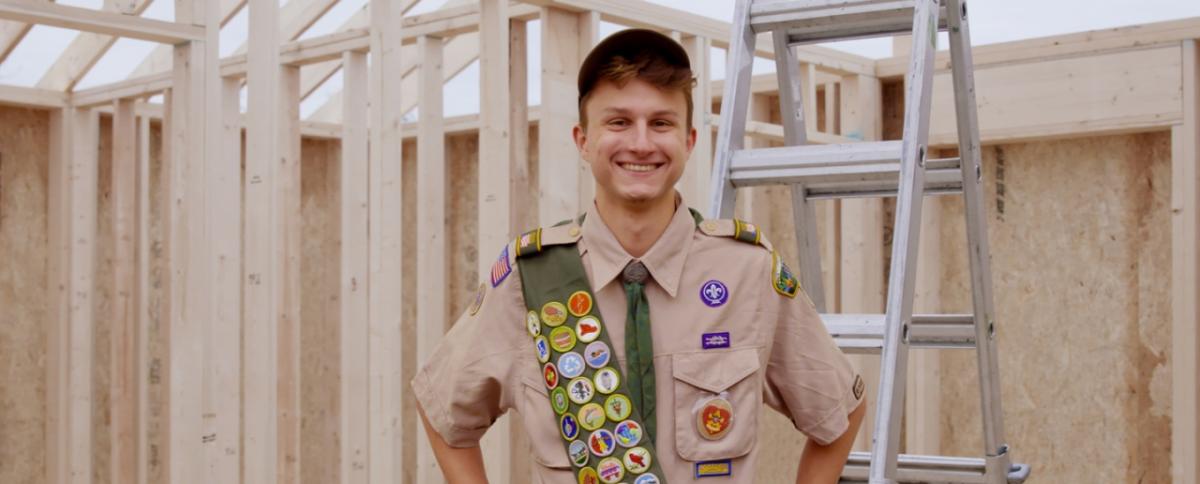Scout’s Vision: Tiny Home for Homeless Veteran
As part of his pursuit of the Eagle Scout rank, Boy Scout Tim Maron led a two-year effort to build a tiny home for a homeless military veteran — a project realized with the help of Wells Fargo.

Scout’s vision: Tiny home for homeless veteran
Step by step, teenager Tim Maron’s vision of home for a homeless military veteran has become reality in a resurgent, small-town neighborhood once infested with drugs and crime.
Today, that neighborhood is known for its clean streets and renovated homes, thanks to a local nonprofit, and most recently a modest tiny house project led by Maron, 17, a Boy Scout and budding young community leader in eastern Pennsylvania.
The tiny house — his Eagle Scout community service project — is destined to become the home for a homeless military veteran in Berwick, about 50 miles southwest of Scranton. At 550 square feet, the small house is comparable in size to a loft apartment in New York City.
“It is really gratifying to finally see all the pieces come together and have the project be built,” said Maron, who began the effort in 2016. “We’ve come such a long way from where it started. It’s been stressful at times, but definitely worth every hour we’ve put into it.”
Maron’s work is one of the latest philanthropic projects supported by the Wells Fargo Foundation’s VeteranWINS program, which provides grants to address veteran homelessness and support sustainable housing for veterans.
His project received a total of $45,000 from the Wells Fargo Foundation: $25,000 from VeteranWINS and $20,000 from the Team Member Volunteer Program. Maron also received $5,000 from the Veterans of Foreign Wars, and he raised the rest of the funds needed from other groups and individuals. The land for the home was provided by Community Strategies Group.
The project hit all the right notes and stood out among the competition, said Jeff Chavannes, VeteranWINS program manager and a U.S. Army veteran.
“There are just moments in life when you have a feeling something is just right,” he said. “Tim’s application was the most unique I had seen. It was clear awarding this grant would not only impact a young man for the rest of his life but also have a sustained impact on the community and veterans for years to come.”
Perfect timing for tiny house
The genesis of the idea came more than two years ago, when Maron needed to develop a service project as part of his path to become an Eagle Scout, the highest rank in the Scout program. He came up with two options: raising money for a public address system for his school’s track stadium or building a tiny house for a homeless warrior — an idea he got from a National Public Radio story.
For Maron, the choice became clear: the tiny home. His family has strong ties to the military, with grandfathers, uncles, and cousins all having served in the armed forces. Maron’s older brother Josh, as part of his Eagle Scout work, helped erect a veteran’s monument in a local cemetery where groups now hold Memorial Day services.
After Maron made his decision, next came the hard part: putting it into action. He needed to find a location, get a zoning change, find an architect, secure a contractor, make a budget, raise money, and learn to write grant proposals, among other things. Most of all, he needed help, said Maron, a top student at Berwick High School who wants to study biology or zoology in college.
Maron brought his idea to local redevelopment officials Rich Kisner and Josh Nespoli, executive director and deputy director, respectively, of Community Strategies Group, a regional redevelopment agency. They immediately liked what they heard. For nearly a decade, their agency had been cleaning up and renovating homes in a once-blighted, high-crime Berwick neighborhood. The revitalization effort has been financed, in part, by nearly $700,000 from the Wells Fargo Regional Foundation and has been energized by team member volunteers, many of whom have pitched in to help build Maron’s tiny home.
In that neighborhood, there was one undersized, orphan lot that nobody knew what to do with since it was too small for a conventional house, Nespoli said.
“The timing for Tim’s idea was perfect,” he said. “He wanted to do a small home and this lot seemed to be the perfect spot for it. We felt we could use his project as a pilot to see how it would work so we could duplicate it again in the right situation.”
Game-changing grant approval
The redevelopment agency became Maron’s biggest ally, advising him on how to work with government offices on zoning and other issues, contractors on business negotiations and work schedules, and charitable funding sources on grant reviews. Maron filed more than a half dozen grant applications. One by one, however, the rejection letters began to arrive.
“It was a shocking thing for him when the rejection letters starting coming in,” Nespoli said. “He was zero for his first six. He did raise a few thousand dollars from groups that wanted to help him get started, but he was beginning to lose confidence in his ability to get this thing done.”
Then Wells Fargo called with the news that VeteranWINS had approved Maron’s grant request, setting off a celebration for the nascent project, Nespoli said.
“That completely changed the momentum 180 degrees overnight,” he said. “Wells Fargo was the game changer for this whole project.”
Gay Maron, Tim’s mother, said there was a tremendous sense of joy and relief when Wells Fargo called with the grant news.
“Tim had gotten so many denials, it felt like we were running out of time and would have to give up on the idea,” she said. “I told Tim that spaghetti dinners weren’t going to raise enough money for this project, but he wasn’t willing to give up. He was so determined.”
Wells Fargo’s support was “really motivational and energizing,” Maron said. “I know this project wouldn’t have happened without it.”
From foundation to framing, roofing to plumbing, the tiny home is finally on the verge of completion, despite heavy rains and other bad weather throughout late 2018. Wells Fargo volunteers from eastern Pennsylvania have donated their time to work on the project. The Department of Veterans Affairs is working to select a homeless veteran who will receive the opportunity to live there rent-free.
“You couldn’t ask for a more compelling story,” said Michael Pany, Wells Fargo’s senior community relations consultant in eastern Pennsylvania, who works with the company’s Regional Foundation projects in the area. “This one is exciting because of its uniqueness. We have no branch in this community, but we have a major investment here, team members who come from across the region to be involved, and we are making a difference in Berwick.”

